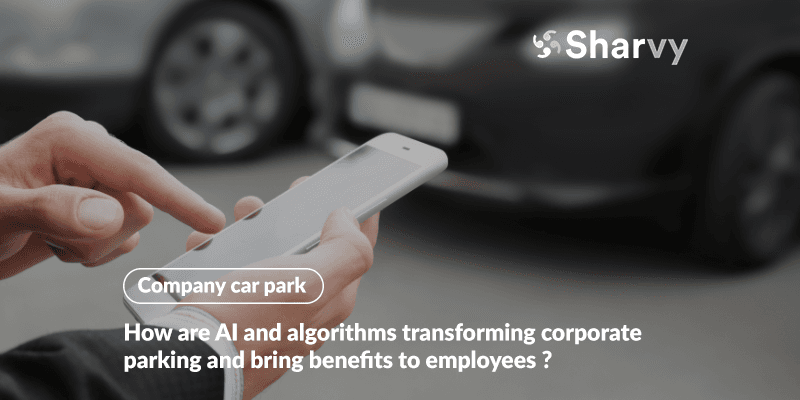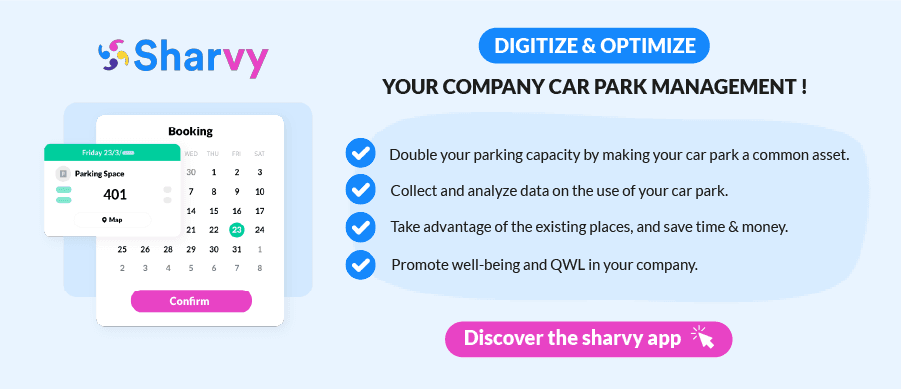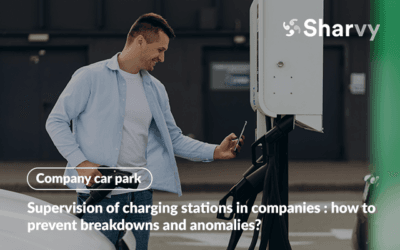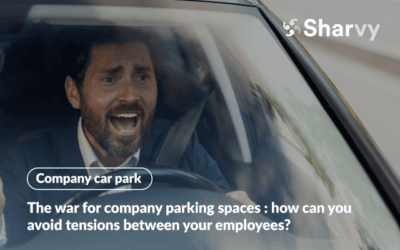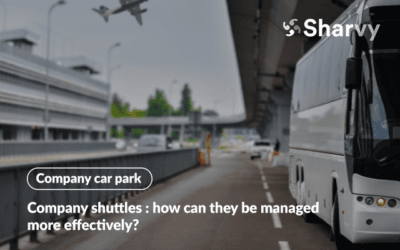Company car parks : a daily headache for many employees. Between the incessant search for a free space, the frustrations linked to unfair allocations & the hours wasted going round in circles, it’s legitimate to wonder if there is a solution.
What if Artificial Intelligence (AI) & algorithms could restore order to this daily chaos? Could we really say goodbye to traditional parking management : FIFO « First In, First Out »?
But how do these innovations really redefine corporate parking, and what are the real benefits for your company & your employees? These are the questions we’ll be answering in this article!
A reminder : the challenges of company car parks management.
1. A delicate balance between supply and demand.
There’s no doubt about it : managing company parking involves a delicate balance between limited supply and growing demand. Every morning, dozens, if not hundreds, of employees set off in the hope of finding a parking space when they arrive. Yet the number of parking spaces available remains static, unable to adapt to changes in the workforce and fluctuating needs.
This constraint gives rise to a series of recurring problems: vehicles turn for long periods in search of a free space on the outskirts of the company, increasing internal traffic and generating unnecessary stress! Worse still, some « » designated parking spaces remain unoccupied due to unnotified absences, while others are snapped up for no apparent reason, leading to a feeling of injustice among employees.
2. A direct impact on productivity and the environment.
Beyond the daily irritation, this poor management has concrete repercussions on productivity. An employee who wastes ten to fifteen minutes each morning looking for a parking space accumulates several unproductive hours over the course of the year. Multiplied by the number of employees concerned, this represents a real hidden cost for the company!
Added to this is the environmental impact : these unnecessary journeys lengthen the time spent at the wheel, increase fuel consumption and, consequently, CO₂ emissions.
3. Changing uses : new challenges to be met.
The difficulties don’t stop there. More and more employees have electric vehicles that require recharging points, and these are often not available at all times!
Similarly, some days of the week are much busier than others, which could justify a dynamic allocation of spaces based on advance reservations & priorities defined by the company.
Unfortunately, the lack of forecasting and optimisation tools deprives employees of any visibility of actual car park occupancy. Today, there are few solutions that allow you to know in advance whether parking will be available or whether it is preferable to opt for an alternative, such as car-sharing or public transport.
Against this backdrop, it would seem essential to rethink how parking is managed in companies, using intelligent solutions that incorporate AI and various algorithms.
The contribution of AI & intelligent algorithms to corporate parking management.
1. Dynamic allocation of parking spaces made easier, thanks to AI.
What does this mean in practice? One of the major advantages of AI is its ability to optimise the allocation of parking spaces in real time.
In other words, rather than having spaces allocated statically, an intelligent system can adjust the allocation of spaces according to the specific needs of each day. For example, if a teleworking employee vacates his or her space, it can immediately be reassigned to another employee waiting for a parking space.
This approach not only maximises the use of available spaces, but also reduces the number of vehicles circulating in the car park, thereby reducing stress & unnecessary CO₂ emissions.
Thanks to apps like Sharvy, dynamic allocation of parking spaces becomes a simple reality to manage on a daily basis. The app adjusts available parking spaces in real time according to booking requests, needs & attendance, guaranteeing a fair & fluid distribution of spaces.
2. Real-time visibility of parking space availability.
Wouldn’t it be easier to arrive in the morning knowing that there’s a space waiting for you? That’s precisely what AI & algorithms make possible, by providing a real-time view of car park occupancy.
Thanks to intelligent sensors installed in each space (and possibly cameras analysing the flow of vehicles), the algorithms constantly collect and update information on free and occupied spaces in your car park. This data is then fed into a car park management application that your staff can access at a glance.
What’s more, the availability of spaces displayed in the application is not limited to those detected as free at a given moment. It also takes into account reservations already made by employees, ensuring that allocated spaces are not already occupied. What’s more, if a permanent space holder vacates his or her space for a day, the space is immediately reinjected into the system and offered to another employee on standby.
The result? You can reliably check the availability of spaces even before you arrive and, if necessary, reserve a space before you arrive.
For the company, this technology also makes it possible to optimise space, by avoiding unused parking spaces and ensuring efficient rotation of spaces. In the end, there are fewer vehicles on the road looking for a parking space, less stress and smoother management of the car park: it’s a win-win situation!
3. Fairness and transparency within the company.
Another major issue in parking management is the perception of unfairness associated with the allocation of spaces.
To alleviate this common problem, there are SaaS solutions for managing company car parks (such as Sharvy), which use a fair algorithm. Rather than allocating spaces randomly & statically, it ensures a fair distribution by taking into account several parameters, and relying on an intelligent prioritisation system.
For example, Sharvy’s algorithm works by allocating spaces first to those who have used them the least over the last 60 days. This sliding system takes into account not only the number of places allocated, but also the status of the user (holder/requestor), as well as their level of priority (on a scale from 0 to 100). This ensures that each employee benefits from a fair distribution over the long term.
What’s more, the application allows administrators to define personalised priorities, for example, by allocating places reserved for pregnant women, people with reduced mobility (PRMs), or any other category of employee requiring easier access.
These priorities are adjusted and managed directly by the administrators according to the rules defined in advance, guaranteeing inclusive car park management that respects everyone’s needs.
As a result, and thanks to this transparent system, Sharvy avoids the frustrations associated with arbitrary allocations, by ensuring that decisions are based on objective criteria that are understood by all.
4. Anticipate needs and peak demandinjust a few clicks.
AI not only optimises the present, it also anticipates the future.
By analysing employee habits, peak traffic days and seasonal trends, algorithms can predict periods of saturation and propose appropriate solutions.
For example, if a Monday morning is identified as a critical day due to a massive influx of vehicles, the system can encourage certain employees to opt for car-sharing or public transport by sending them personalised recommendations. These can be sent automatically via the application, enabling users to make informed decisions even before they arrive on site.
If you have a Parking Management application, you can also prioritise access to the car park for employees who declare themselves as carpoolers on busy days. This can encourage your teams to favour more ecological & collective transport options, thereby reducing vehicle overload, as well as the environmental impact of your car park.
5. Access to company car parks made easier for employees & visitors by AI.
You’ve probably already experienced it: getting into a company car park is often a bottleneck: queues at peak times, forgotten badges, access codes that can’t be found… All this generates stress and wasted time. But AI and algorithms can help to make this process more fluid by automating and optimising access to the car park.
Firstly, thanks to a licence plate recognition camera (ANPR system), AI instantly identifies authorised vehicles and triggers the opening of the barrier without human intervention. The algorithm compares the number plates with the database of authorised vehicles, guaranteeing smooth access without the need for badges or tedious handling.
What if your company doesn’t have cameras? Don’t worry. With an IoT module, you can open the barrier directly from a dedicated application (like Sharvy), with a simple click on your phone. No need to roll down your window in the rain & desperately search for a badge left in your bag.
But the benefits of these technologies don’t stop there. The algorithms also provide intelligent access management, anticipating vehicle flows and avoiding congestion at peak times. By optimising access allocation, they guarantee better organisation of entry & exit, reducing traffic jams and improving your day-to-day parking experience.
Curious to find out more? Find out how Groupe Up is using the ANPR system to facilitate car park access.
In conclusion
Your company car park no longer has to be a daily battleground where everyone tries to find a space before the start of the day. Thanks to AI & algorithms, car park management becomes fluid, anticipated & fair. No more running around in circles hoping for a miracle: spaces are allocated intelligently, availability is known in advance & specific needs (electric vehicles, PRMs, visitors) are finally taken into account.
But beyond individual comfort, it’s the whole company that stands to gain : less stress, more productivity & a lighter environmental footprint.
Got a question? Check out the following FAQ !
Can AI really eliminate all parking problems in corporate parking?
AI can’t work miracles, but it can make parking management much more efficient. It optimises the allocation of spaces, anticipates needs and reduces the conflicts associated with poorly managed company car parks. On the other hand, if the car park is too small for the number of vehicles, it will still be necessary to think about alternative solutions (adding extra spaces, carpooling, rotating spaces, etc.).
Can AI detect and prevent fraud in your corporate parking?
Imagine arriving at your company car park, swiping your badge & approaching the barrier with your car… and nothing happens. No reservation? No access!
Thanks to AI and intelligent algorithms, car park management becomes uncompromising when it comes to the little rascals who try to infiltrate without authorisation. The system checks in real time whether you have reserved your space and whether you are one of the authorised employees. If not, the barrier remains closed.
At the same time, various sensors and cameras can detect unauthorised parking, immediately sending an alert to the managers. The result: a better-organised car park, more respect for the rules and greater peace of mind for all employees.
Want to find out more? Check out our latest articles to stay up to date!
Supervision of charging stations in companies : how to prevent breakdowns and anomalies?
Why is the supervision of charging stations essential for businesses? How can you prevent breakdowns and ensure their reliability? Focus.
The war for company parking spaces : how can you avoid tensions between your employees?
Company parking spaces : a real headache? Find out how to avoid tensions and put people’s minds at rest in this article!
Company shuttles : how can you optimise their management to reduce your carbon footprint?
How can you optimise the management of your company shuttles? What are the environmental issues involved? What are the benefits for your company?
Subscribe to our newsletter!
Resources
Contact us
+44 117 463 6990

